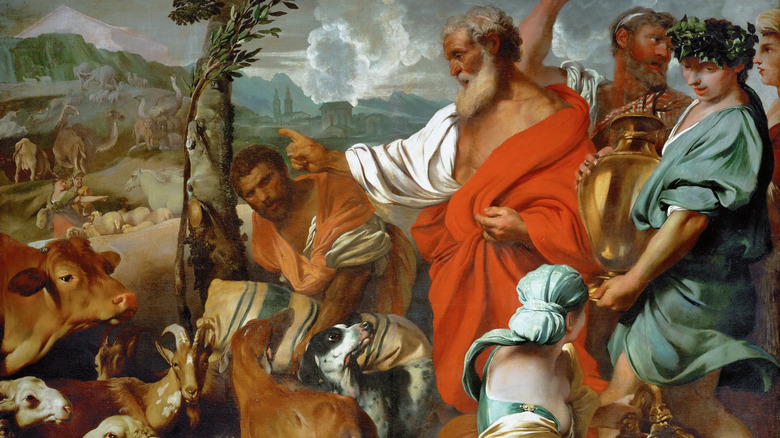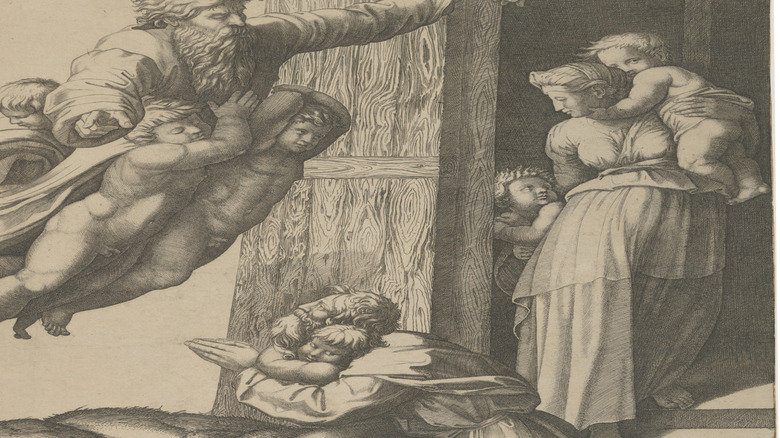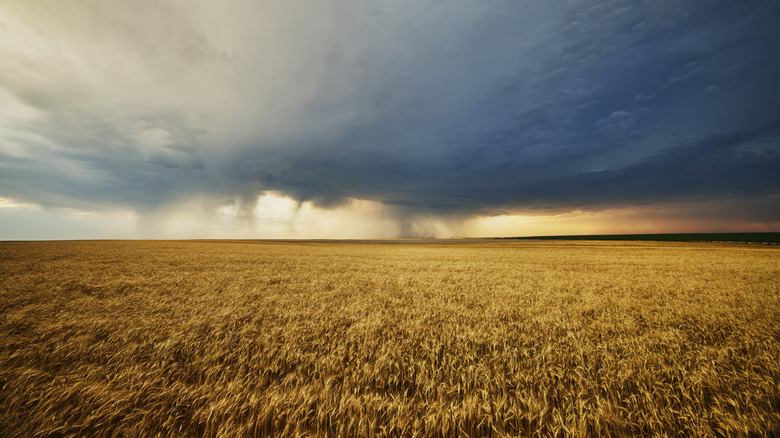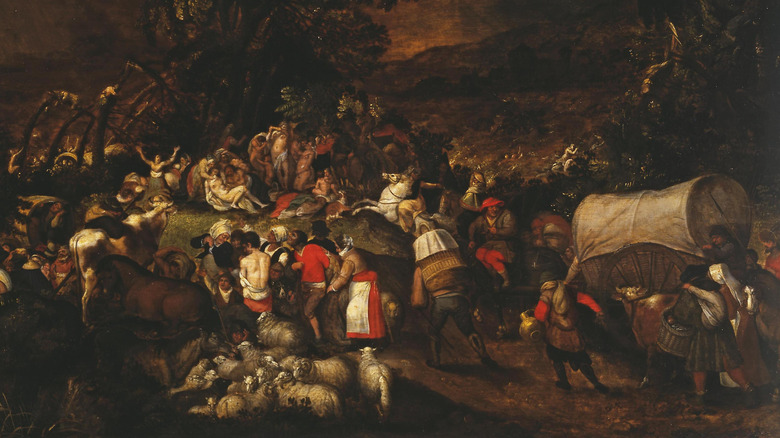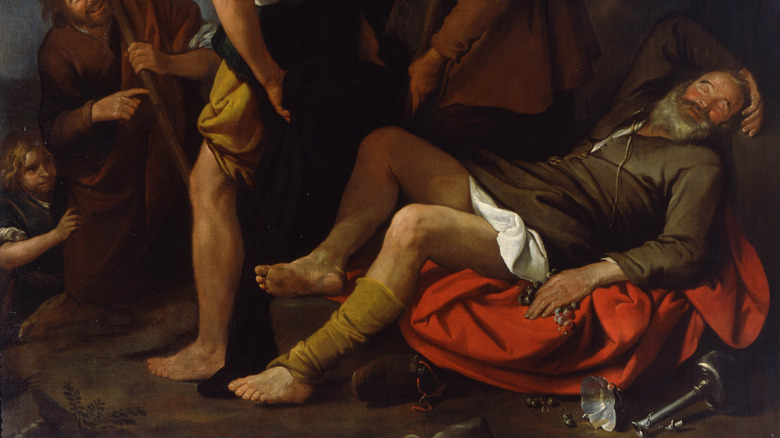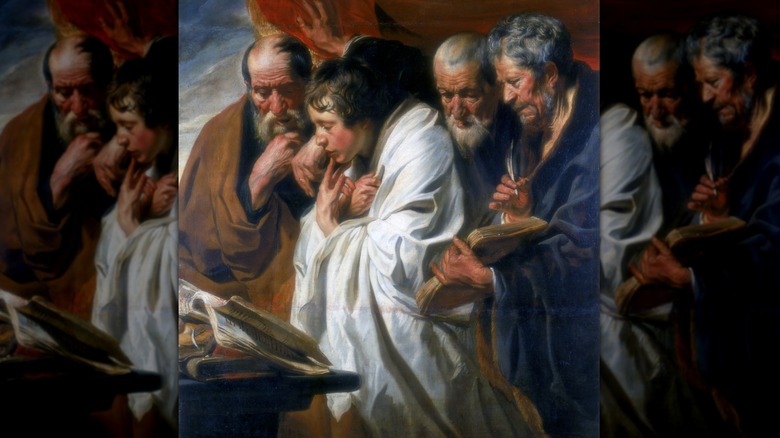Things Most People Don't Know About Noah From The Bible
We may receive a commission on purchases made from links.
Ray Comfort was an unhappy man in 2014. A Christian evangelist, Comfort had seen Darren Aronofsky's film "Noah" and found it exploitative, profiteering, and indifferent to the core message of the Genesis flood narrative. That message, Comfort told The Christian Post, was one of judgment. "Noah's" screenwriter's contention that expansion and interpretation were necessary when adapting such a short section of the Bible did not assuage Comfort. He felt so strongly about what he saw as Aronofsky's shortcomings that he directed his own flood film, "Noah — and the Last Days," which not only latched onto a more literal interpretation of Genesis but also argued that Noachian prophecies confirm our present time as the end of days.
Comfort did not have much support in his criticisms from the religious community. Indeed, Aronofsky's "Noah" received measured praise by many in the Jewish and Christian faiths across denominations. The writers behind the movie consulted heavily with religious scholars in developing their script. True, it did deviate significantly from the story of Noah as told in the Bible. But then, the biblical account of Noah's life is a sparse one, and its depiction of the Great Flood and the building of the ark leaves a great deal unsaid.
But the Bible is not the only source we have for figures like Noah. Noncanonical literature holds tales about the man who survived the Flood, tales that have inspired artistic works like Aronofsky's "Noah" and even represent an entire tradition such interpretations belong to. Some of these flesh out Noah's life in little-known and downright bizarre ways. Here are just a few of them.
Noah grew up under an assumed name
Like so many prominent figures in the Bible, Noah only comes into his own story when he is a man grown. The first mention of him is in Genesis 5:28 (via Bible Gateway), last in the list of Antediluvian patriarchs. He's 500 years old by the time he has children of his own, who are grown and married by the time God commands Noah to build the ark. Besides the fact that he kept faith with God and was "blameless among the people of his time," there's nothing said about Noah's life or character.
For such details, we must turn to the Book of Enoch, the controversial but enduring work of pseudepigraphal apocalyptic literature. Enoch's longevity can perhaps come down to two features: its extensive material on angels and demons, and its expansion of the biblical flood narrative, with Noah's life included in the latter. Chapter CVI (via the Internet Sacred Text Archive) paints Noah's birth in near-miraculous terms. He comes into the world with white hair, eyes that blaze like the sun, and a body "white as snow and red as the blooming of a rose." What's more, the infant Noah immediately begins talking to God.
The same story appears in Louis Ginzberg's "Legends of the Jews." There, Noah's appearance frightens his father Lamech, until he is reassured by his own father, Methuselah. Methuselah becomes the only man to speak Noah's name as the boy grows up, for fear that a fad for sorcery might ensnare him if his true name were widely known. To the outside world, Noah is known as Menahem, the comforter.
Noah's birth fulfills a prophecy and begats miracles
To be born with white skin and hair, eyes as bright as the sun, and an immediate rapport with God himself — as Noah is in the Book of Enoch — would, you might think, be miracle enough for anyone. Next to all that, the fact that he was also born circumcised seems incidental. But the latter trait is given greater weight in Enoch, for it is a sign that Noah is the one to fulfill a prophecy dating back to the time of Adam. Per "Legends of the Jews," before Adam and Eve fled the Garden of Eden, God told Adam: "Cursed is the ground for thy sake." When Adam asked how long the curse would endure, God replied: "Until a man child shall be born whose conformation is such that the rite of circumcision need not be practiced upon him."
The curse of Adam was evidenced before Noah's birth by the transfiguration of crops. Farmers who planted wheat would get oats for their trouble, and in the ancient world, oats were regarded as a lesser grain for livestock and peasants. Farmers worked their unreliable fields with their bare hands and contended with stubborn beasts of burden. But upon Noah's birth, sown wheat grew true and livestock obeyed their masters' commands. And in his manhood, Noah reportedly invented all the basic tools of the farmer's trade: the scythe, the plow, and the hoe.
Noah was a harbinger of the coming flood to mankind
In Genesis, God's decision to wipe the Earth clean of life is made quickly and resolutely. Only Noah and his family find favor in God's eyes, and they alone are given any chance at salvation. But Jewish tradition and rabbinical literature expanded considerably on this decision and the role Noah played in it. This tradition, as collected and told in "Legends of the Jews," has God inclined toward mercy even after he comes to regret creating mankind, with Noah as the messenger of God's choices for humanity.
In this telling, Noah is given 120 years to proselytize to the people, heeding them to abandon wickedness and return to righteousness. All the while, however, Noah continues to build the ark by angelic guidance. The flood in this version of the story is a potential disaster, one that can be averted if the people listen to Noah but still a very real possibility. The lifespan of Methuselah acts as a ticking clock for the window of repentance. Alas, no one takes the warnings seriously; they mock Noah's message and his building. More than that, they claim they know how to protect themselves against any sort of flood God can send against them.
Even after Methuselah's death, God hedges. He gives humanity an extra week to reconsider their ways. During this time, per "Legends of the Jews," "the laws of nature were suspended, the sun rose in the west and set in the east." God also gave the wicked a glimpse of the wonders of the afterlife, if only to show them what they'd lost.
There's questions over the nature of Noah's drunkenness
Popular accounts of Noah and the Flood focus on the big picture: the destruction of the Earth and the new covenant with God once the waters recede. They tend not to mention Genesis 9:20, the part of the story where Noah plants a vineyard, makes wine, and gets drunk. So drunk, in fact, that he lies naked outside his tent and has to be covered by two of his sons. When he recovers, he curses his grandson Canaan, who reveals Noah's drunkenness to his disrespectful father Ham.
This curse upon Canaan was later used to justify Israel's conquest of the Canaanites and the institution of slavery, though the nature of Noah's curse is a lingering theological question. As for Noah's drunkenness, it became a surprisingly popular subject for artists. But it's triggered theological debates of its own. The drunkenness of Noah is a strange and brief episode in the aftermath of the Great Flood, and it seems to be at odds with the idea of Noah as the one righteous man left in the Antediluvian world.
Noah's drunken state has been used to moralize about the evils of alcohol or even to denigrate Noah himself, but there is no condemnation of Noah's behavior within Genesis. Some commentators have tried to excuse Noah's behavior on various grounds. He was burdened by the trauma of the world's end and sought to self-medicate, some say. Or perhaps, as the first man to grow a vineyard, he didn't expect to get drunk. Or maybe he was trying to get high to better comprehend the Torah. Name your poison.
The book that bares his name is partially lost
The Book of Enoch is named for the seventh Antediluvian patriarch, Noah's great-grandfather and one of only three people supposed to have been taken up to Heaven in both body and soul. Enoch loomed large in the early Jewish and Christian communities. He's the subject and the attributed author of numerous works, though his general fame and the notoriety of the Book of Enoch, in particular, weren't enough to earn it a place in the canon of either Judaism or Christianity (with the exception of the Ethiopian and Eritrean Orthodox Churches).
But just as the Bible is more accurately thought of as a library rather than a book, so too is the Book of Enoch a collection rather than a single volume. And contained within that collection are fragments of Enoch from the Book of Noah, another pseudepigraphal text. This book was quoted in numerous non-canonical religious texts. It apparently held stories about Noah and his descendants learning the art of medicine from the angels, as well as instructions for conducting sacrifices. It's widely believed that sections of the Book of Enoch are directly taken from the Book of Noah.
Unfortunately, such quotes and fragments are all we have of the Book of Noah. While there is good evidence that a book or books attributed to Noah existed (per the Virtual Jewish Library), those source texts for the fragments quoted in Enoch and elsewhere have been lost.
